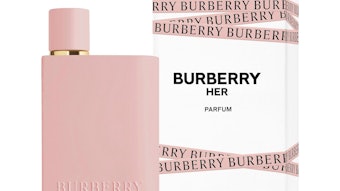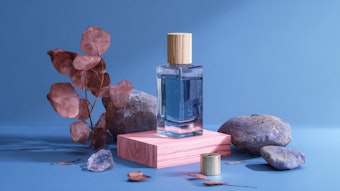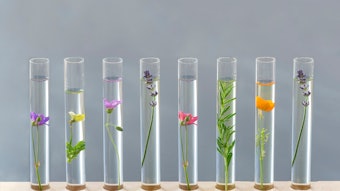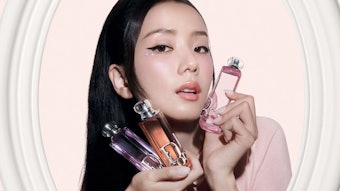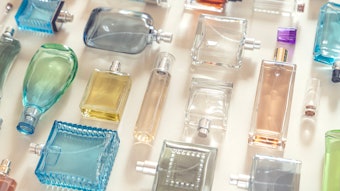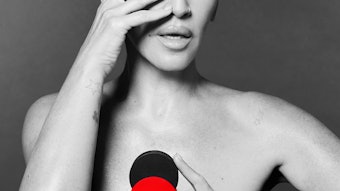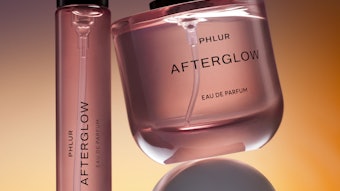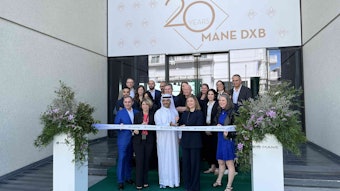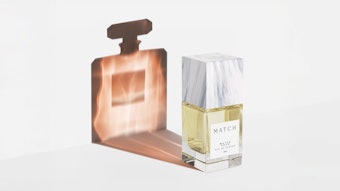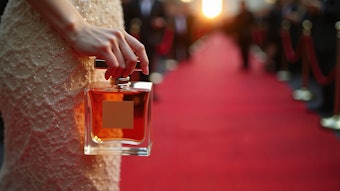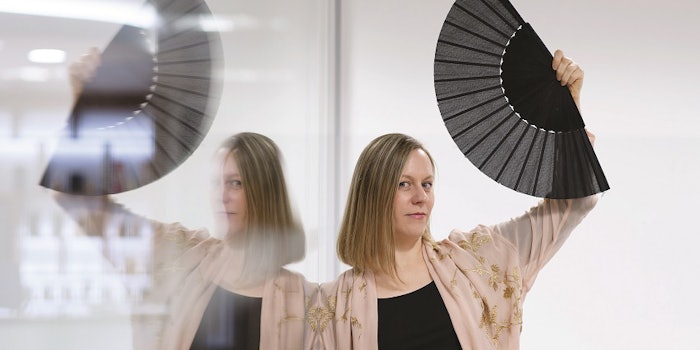
Julie is a young perfumer at CPL Aromas and has already made a very successful entry into the world of British perfumery. Originally from France, her life has been directed by total determination to become a perfumer. Her recent wins include Nude by Jasper Conran, Color Dreams by Franck Muller and 41 Burlington Arcade by Atkinsons.
“I found it interesting to compare how people come to the profession of perfumery in Britain versus France – it seems that in Britain, a lot of people discovered perfumery by accident,” Julie says.
“If someone has a musical ear, they can train themselves to hear both the music and the individual instruments. For someone who is not trained in music, they will just hear the overall sound. It is the same with smells.”
It’s true. Many people in the British fragrance industry have come to it by coincidence or a surprise discovery. Some have come to fragrance from related industries: food, paints, adhesives – stumbling into perfumery by accident and never looking back. In France, people seem to be generally more aware that perfumers exist, and since the most famous perfumery schools are there too, seeking perfumery as a profession is more intentional.
In France, the strong presence of the fragrance industry and the concept of perfumery are more integrated into the everyday experience, though the role of a perfumer is still somewhat mythologized. “When I tell people back home what I do for a living, they say ooh, you’re a nose!” says Julie and laughs, “but actually the reason you are able to differentiate between smells or be more sensitive to smells is because of all the training we have done. At the beginning of your career, all you need is a normal nose – but no special smell ability beyond that. The nose is an important tool, but it’s our brain we use as perfumers.”
Our brains develop new neural pathways when we study smells and train our nose. Similar to increasing your IQ by study, it is possible to increase our smelling prowess by conscious smelling.
Julie compares trained perfumers to musicians: “If someone has a musical ear, they can train themselves to hear both the music and the individual instruments. For someone who is not trained in music, they will just hear the overall sound. It is the same with smells.”
Le Loto Des Odeurs
Julie did not grow up in a fragrance-oriented family. Her parents were interested in herbal remedies and aromatherapy – just not perfume. “I had a nanny as a child and it was her massive perfume collection that first got me curious,” says Julie. “My cousin and I used to play this game called ‘Le Loto Des Odeurs,’ and a while back she told me how annoyed she used to get when I won all the time, even though it was her game.”
In Le Loto Des Odeurs, players have one or two boards and try to successfully match one of the scent vials from a possible 30 with pictures on their boards.
“When I was young I saw a film called ‘Fanfan’ with Sophie Marceau, in which she was a student at ISIPCA,” explains Julie. “I decided on the spot – she is doing my job; that’s what I want to be."
Julie went on to complete a Masters degree in chemistry of flavors and fragrances from Le Havre.
She started her fragrance career at Mane, working as a chemist. Julie enjoyed the work but felt frustrated: “My job seemed to be taking me further from smelling materials and working with them creatively, so I talked to my boss about it. He told me about a new school, Grasse Institute of Perfumery (GIP), that had opened up a few years ago.”
“I contacted GIP, and they gave me a chance to study what I wanted. I did their course the following year,” Julie explains.
Her internship after GIP was at Fragrance Resources as a compounder. This turned out to be Julie’s winning lotto ticket: “It just happened that as I was about to finish my internship, someone left the company and they offered me the role of a perfumer’s assistant. So, I was there at the right time. You have to be the right person, in the right place and at the right time.”
The “Open Perfumery Degree”
In a way, Julie has put together her own open perfumery degree through a combination of traditional education, perfumery school and on-the-job learning.
At Fragrance Resources, Julie was the assistant to Raymond Carlavan. He has since retired, but at the time, Fragrance Resources had its creative center in Paris and manufacturing in Grasse. Raymond was the only perfumer working from Grasse. He has a flavorist background and studied at the Roure school in Grasse.
“Because of his flavorist training, he was not doing classic perfume bases, which was very interesting, and I learned a lot from him,” explains Julie. “He knew of my ambition to become a perfumer and he would stop to teach me and explain why he was doing certain things. He’d sometimes tell me to have a go at a project on my own, too, and really pushed me to use my imagination.”
“We sometimes had some weird requests – the smell of blood or electricity…” Julie grins. “You definitely don’t study those kinds of accords in perfumery school, so I learned that you have to use your imagination and your knowledge of raw materials instead – and not be afraid of trying things that you would never put together.”
From Grasse to Paris
After a year of working for Fragrance Resources, Julie received her first perfumery job offer. She knew she had to take it to follow her dreams.
“The small perfume company I started working for in Paris specialized in creating natural fragrances for small cosmetic brands, and I stayed for almost five years,” explains Julie.
“There are a lot of little personal care and cosmetic brands in France, and they don’t tend to work with the bigger fragrance companies due to their size. We were a niche supplier for this market.”
“In the beginning, when I started there in 2007, brands wanted natural fragrances that smelled like mixed media or synthetic fragrances – and of course it was obviously never possible,” she says. “You can use isolates and natural materials to mimic some of the effects, but they will never be the same. Nowadays, brands and customers who are really into natural fragrances expect them to smell different from synthetic fragrances. Things have changed.”
Speaking of change, in 2011, a new opportunity opened up for Julie in the UK with Fragrance Oils in Manchester.
“I had always wanted to experience living abroad, so when I had this chance to move, I took it. I didn’t even ask myself whether I should – it was obvious,” says Julie.
The Umbrellas of Manchester
“The weather was a bit of a culture shock,” says Julie, “but at least I had Paris in between Grasse and Manchester,” she says and laughs.
Her role at Fragrance Oils was to work on global projects, mainly in personal care. Julie also joined the fine fragrance team and worked on some household and air care. “We had a great atmosphere and a good team there,” says Julie. She stayed in Manchester for just under three years.
“I enjoyed the idea of living abroad and have enjoyed being in Britain - but of course also wanted to take the next step with my career, so when CPL Aromas had an opening, I was happy,” explains Julie, “and the very first thing I got involved with was their Colombian division and was sent there twice, so I got to travel more without moving my whole life to another country.”
Julie tells of her experiences with Colombian fragrance preferences: “All-purpose cleaners and other household products where you might usually encounter mainly herbal citrus of fresh fragrances in Europe would smell of cinnamon or fruits instead. Something like apple and cinnamon could go into an all-purpose cleaner there, whereas for us here it would be a Christmas smell. They also use citronella – and the most important factor is for the fragrance to be strong. Generally, they also have a stronger preference for fruity florals than in Europe in personal care and fine fragrance, and love celebrity scents.”
After the first six months, CPL Aromas reorganized, and Julie moved to the UK team, where she has since worked on fine fragrances, household and personal care. “We have quite a lot of freedom, and our work varies from larger, recognized brands to niche. I also get more contact with customers here,” explains Julie.
“When working for niche brands, we have more flexibility with budgets and can use very nice raw materials. Working for highly commercial global brands can be interesting but has its limitations.”
The International Society of Perfumer Creators
Julie has recently joined the committee of the new international French perfumers’ society, SIPC (la Société Internationale des Parfumeurs-Créateurs). The SIPC sets its main mission to define the profession of the perfumer, defend the range of raw materials used by perfumers and fight the courts for granting the same intellectual property rights for perfume creations that other forms of creative arts currently receive. The society also intends to bring together in “La Maison du Parfum” what it considers to be the three most important pillars of perfumery knowledge: the society itself, the French Society of Perfumers, its library and the Osmothèque.
“Things are progressing – but slowly – the society still needs more recognition in the media,” explains Julie, “and in some ways the bigger fragrance companies have to take it on faith that the mission of the society is worthwhile for the whole industry. They need to support it so that it will benefit us all. I am glad I am not in the intellectual property committee because that one is going to be a tough fight!”
With the barriers to entry lower than ever before for getting hold of raw materials, equipment and some basic instruction in the practical elements of blending, the flip side is that there are more and more people out there who call themselves perfumers – and business-to-business clients don’t currently have a reliable way of differentiating between those with experience and those without.
The current proposition of the SIPC acting as a kind of official body for perfumers is, of course, somewhat paradoxical because the very people who automatically qualify (perfumers already vetted and further trained by leading fragrance companies) also don’t need an additional certificate to verify they are professional perfumers. So, the memberships from the larger companies truly are going towards supporting the loftier goals of the society.
It is the smaller companies and independents who would benefit most from a verified status. “The whole industry benefits if there is a clear protection of the profession,” explains Julie. “A lot more people are aware of perfumery these days because of the internet and media, and a lot of courses and schools are appearing – but you don’t really know who is a perfumer. It is important to protect the profession because customers can be put at risk if people don’t know what they are doing and might not be following the safety guidelines and regulations.”
“The society is also working towards protecting creations,” Julie adds. “The SIPC wants recognition that perfumes are [a] work of the mind. This is important work, and while the society is still establishing itself, it has to look to the big companies to support it in its early days.”
Julie is right that there is now more need to help the industry define and protect itself than ever before. This can only be achieved if all the goals and intentions of the industry can be aligned – and it remains to be seen whether the SIPC is going to be successful in being both modern and protective in its approach.
It is understandable that Julie would be in favor of helping an organization that is intent on protecting the status of perfumers, given how hard she has worked to become one.
*All photos courtesy of CPL Aromas.


